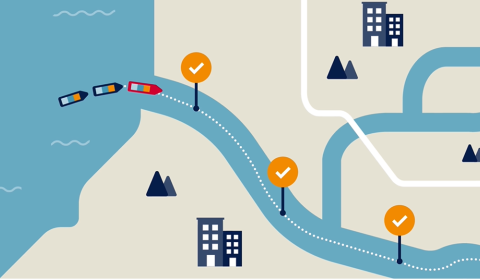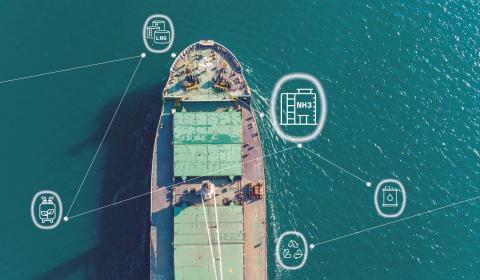
Applying the ‘vessel train’ concept to waterborne transport
Making inland water transport more efficient and extending the network to urban areas is a key plank in EU transport policy. The NOVIMAR ‘vessel train’ concept developed together with BV and other industry players - based on the concept of road convoys or ‘pelotons’ - could offer a vital solution to current bottlenecks.
A green alternative
Inland waterway transport offers a green alternative to road and rail, both in terms of energy consumption and noise emissions.
European Commission policy aims to promote and strengthen the inland waterway network. This includes extending inland transport to the urban environment, increasing automation, and promoting greater integration into the multimodal transport chain.
Transport bottlenecks
An innovative new system has now been developed to assist in this expansion. Navigational bottlenecks are a major obstacle to expanding inland networks. Draught and lock restrictions limit the volume of traffic, as do constraints on vessel length, width and clearance height.
A system based on the concept of road convoys is now taking shape that could overcome some of these problems.
NOVIMAR project
To get round the issue of bottlenecking, the NOVIMAR project (Novel Inland water transport and Maritime transport concepts) proposes a waterborne version of road ‘platooning’, or vessel ‘convoys’.
The concept optimises both the available navigational ‘windows’ and resources.
The vessel train consists of a Lead Vessel, plus a number of Follower Vessels which are remotely controlled by the Lead Vessel and are operated with a reduced crew.
The project offers cost efficiency, while also maximising the use of waterways at optimum periods.
Industry stakeholders
NOVIMAR was developed by a group of 22 leading industry players in seven EU and two associated countries, including logistics operators, public bodies and research organisations.
Advances have already been made on the train’s technology, safety aspects, and operations, as well as new designs for vessels and cargo handling systems. Its economic viability has also been established.
Bureau Veritas has played an active role in the creation of the concept, focusing particularly on Safety Issues and Human Skills. This has included evaluating the safety of the vessel train operation and analysis of the cyber security issues.
BV has also contributed to the study on working conditions and the human skills needed to realise the project, and participated in key policy development discussions.
New vessel designs
The founders envisage a potential launch by 2025, following consultation with regulatory bodies and system preparation.
Existing vessels can be used in the NOVIMAR concept, provided they have been fitted with new equipment developed for the project. Where a route combines inland waterways and short-sea voyages, the vessel must be already adapted for such navigation.
However, NOVIMAR has also developed a proposed new vessel design (including the cargo system) in order to optimize the vessel train concept. In the future, new upgraded designs may be created.
The project will also require the creation of a vessel train control system and the adaptation of port and inland terminal cargo handling.
Showing the possibilities of the concept, the train could for example link Bergen, Norway, to Basel, Switzerland, taking in the cities of Kristiansand, Rotterdam, Vlissingen, Ghent, Antwerp, Duisburg and Mannheim en route.
Regulatory discussions
Recommendations to regulatory bodies form a key part of the project, while other areas to be worked on include:
- Regulations relating to the joint operation of conventional vessels and vessel trains
- Optimised working conditions, and training needs
- Development of command control technology relating to speed and communications
- Potential new navigational aids for vessel trains
- Development of revised concepts for ro-ro cargo systems
Meanwhile, Bureau Veritas will play a key role in advising how both statutory rules and class rules should be adapted to the project.










